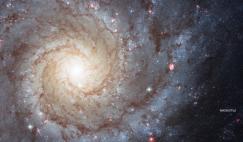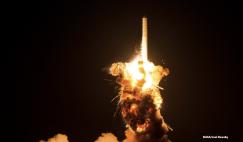The US Federal Communications Commission (FCC) has, by a 5-0 vote, approved Amazon’s plans to deploy its Project Kuiper mega constellation of 3,236 satellites, so that the internet giant can provide continuous broadband internet access to millions across the globe.
Amazon filed its application to the FCC last July, requesting the distribution of the satellites in 98 orbital planes at three different altitudes (590 km, 610 km, and 630 km). This would allow targeted coverage between 56° north and 56° latitude ranges; a swathe of sky which covers the vast majority of the populated world.
“Amazon will invest more than $10 billion in Project Kuiper. This investment will create jobs and infrastructure around the United States, build and scale our ground network, accelerate satellite testing and manufacturing, and let us deliver an affordable customer terminal that will make fast, reliable broadband accessible to communities around the world,” said the company in a statement yesterday.
Amazon had hoped to include its application with earlier application processing rounds so that it could be on an equal footing with other constellation operators vying to operate in similar Ka-band frequencies, however the FCC said it was not willing to waiver the set deadline it had imposed and that it expected Amazon’s mega-constellation rivals to not withhold information that would limit Kuiper in starting its operations.
The company has until 2026 to launch half of the constellation to retain its FCC license, and then the remaining satellites by 2029.
The application was granted provided Amazon fulfilled a number of other conditions such as not unduly interfering with previously authorised satellite ventures and providing the FCC with a finalised plan for how it will mitigate orbital debris.
Although Amazon have yet to complete the final design for its constellation, the FCC report stipulates that the company proposes to deorbit their satellites in no more than 355 days - a shorter time frame than the 25-year standard established by NASA.
Around 38,700 satellites short of SpaceX’s proposed full blown mega constellation, give or take a few, the vast influx of satellites expected to dominate the skies in the next few years is staggering.
So far, SpaceX has launched more than 500 Starlink satellites and UK-based OneWeb, which filed for bankruptcy earlier this year but was bailed out, has already launched 74 of its intended constellation of 650 satellites.
The sheer scale of objects filling the skies is becoming a major concern. With an estimated number of 900,000 objects larger than 1 centimetre and 128 million objects larger than one millimetre expected to reside in earth orbits, unless space debris mitigation measures are properly implemented by spacecraft designers and missions operators, the problem will only get worse.
Apprehension about the deployment of large constellations is also being voiced by worried astronomers who already see unwelcome trails of satellite trains streaking through the night sky.
However, it is not just visible light observations that are affected. Mega constellations have the potential to disrupt astronomical observations in radio frequency bands, as some radio bands not allocated to the radio astronomy service are still used by astronomers.
While Kuiper does not intend to transmit in bands allocated for radio astronomy or immediately adjacent bands, the FCC has suggested that Amazon look into any potential overlap of use.
“Although not a condition to the authorization, Kuiper should be aware of these facts and contact the National Science Foundation Spectrum Management Unit (esm@nsf.gov) to assist with coordination and information on radio astronomy sites,” the FCC report states.
According to a previous filing with the FCC, Amazon intends to launch its Kuiper System satellites in five waves.
Jeff Bezos’s firm has not said when those satellites would be launched or what launch vehicle they would use to reach orbit, but the billionaire also owns launch company Blue Origin. Its New Glenn orbital rocket is slated for a first launch in 2021.











